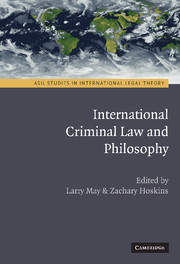Book contents
- Frontmatter
- Contents
- List of Contributors
- Introduction
- PART ONE SOVEREIGNTY AND UNIVERSAL JURISDICTION
- 1 International Crimes and Universal Jurisdiction
- 2 State Sovereignty as an Obstacle to International Criminal Law
- 3 International Criminal Courts, the Rule of Law, and the Prevention of Harm: Building Justice in Times of Injustice
- PART TWO CULTURE, GROUPS, AND CORPORATIONS
- PART THREE JUSTICE AND INTERNATIONAL CRIMINAL PROSECUTIONS
- PART FOUR PUNISHMENT AND RECONCILIATION
- Index
- References
1 - International Crimes and Universal Jurisdiction
Published online by Cambridge University Press: 19 January 2010
- Frontmatter
- Contents
- List of Contributors
- Introduction
- PART ONE SOVEREIGNTY AND UNIVERSAL JURISDICTION
- 1 International Crimes and Universal Jurisdiction
- 2 State Sovereignty as an Obstacle to International Criminal Law
- 3 International Criminal Courts, the Rule of Law, and the Prevention of Harm: Building Justice in Times of Injustice
- PART TWO CULTURE, GROUPS, AND CORPORATIONS
- PART THREE JUSTICE AND INTERNATIONAL CRIMINAL PROSECUTIONS
- PART FOUR PUNISHMENT AND RECONCILIATION
- Index
- References
Summary
INTRODUCTION
Most crimes are municipal crimes subject to municipal criminal law. There are some crimes singled out as international crimes subject to international criminal law, however. The main purpose of this chapter is to answer the question, “What are international crimes?” One could take this to be a lawyer's question – asking for a descriptive account of the criteria used in the actual practice of international criminal law to identify international crimes. Alternatively, one could take this to be a philosopher's question – asking for a normative account of what it is about some crimes that makes it appropriate or even morally required to subject them to international criminalization. In this chapter, my approach is neither exclusively normative nor exclusively descriptive, partly because I do not believe that we can always nicely separate the two approaches in theorizing about the law. The difficulty in separating the two approaches is especially acute in the case of international criminal law, not only because international criminal law is still at a relatively formative and fluid stage, but also because its legitimacy is by no means uncontroversial and, therefore, not to be taken for granted. Any plausible account of international crimes as a legal theory, therefore, has to interpret the actual practice of international criminal law without the benefit of a high degree of certainty about what the “raw data” are.
- Type
- Chapter
- Information
- International Criminal Law and Philosophy , pp. 15 - 38Publisher: Cambridge University PressPrint publication year: 2009
References
- 4
- Cited by



